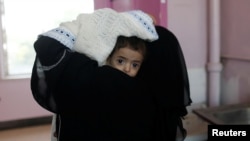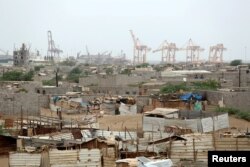The U.N.’s humanitarian chief warned Friday that aid workers are “losing the fight against famine” in war-torn Yemen.
“The position has deteriorated in an alarming way in recent weeks,” Undersecretary-General for Humanitarian Affairs and Emergency Relief Coordinator Mark Lowcock told the Security Council. “We may now be approaching a tipping point, beyond which it will be impossible to prevent massive loss of life as a result of widespread famine across the country.”
The U.N. has been raising alarm bells on the food crisis in Yemen for more than a year. Lowcock said Yemen’s deepening economic troubles have escalated the situation.
Millions of Yemenis no longer have regular salaries, including public servants who have not been paid in two years. In the past month, the local currency has plunged 30 percent in value, throwing one of the world’s poorest countries into further economic despair.
“Because almost all the food consumed in Yemen is imported, that translates directly into a sharp increase in the price of food for some 10 million Yemenis who are food insecure but are not reached by the relief operation,” Lowcock said.
He said humanitarians are starting to see pockets of famine-like conditions, including where people are eating leaves because they have no other food sources.
Aid workers currently assist some 3 million people each month, but Lowcock said they hope to massively expand to reach 8 million this month. But that is a fraction of those in need. The U.N. says 18 million Yemenis are food insecure, and 8 million of them are severely insecure and do not know where their next meal will come from.
Food insecurity is also being exacerbated by an intensification of fighting around the strategic Red Sea port city of Hodeida.
Hodeida is a lifeline for Yemen. The country imports 90 percent of its food, fuel and medicines, and 70 percent of those goods come through the city’s port. The Houthis have controlled Hodeida for the last two years and the Saudi-led coalition has stepped up military efforts to break their hold.
Despite an international arms embargo against the rebels, the coalition accuses them of using the port to smuggle weapons into the country, a charge the Houthis deny.
“We have to keep all the ports open, we have to keep all the main roads open, we have to keep them functional, we have to keep them safe,” Lowcock told council members. “The lifeline through which the aid operation runs now hangs by a thread.”
The aid effort is well-funded, with $2.6 billion committed this year, including large contributions from Saudi Arabia and the United Arab Emirates, who are conducting the airstrikes.
The Saudi-led coalition began bombing Houthi rebels in support of the Yemeni government in March 2015. Since then, the U.N. estimates more than 10,000 people have been killed, mostly due to airstrikes.






